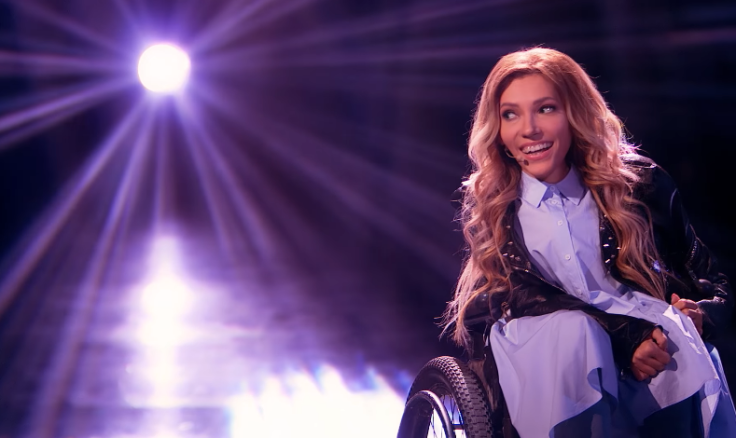Ukraine bans wheelchair-bound Russian singer Yulia Samoylova from Eurovision Song Contest
Controversy surrounding Russia's entry for the 2017 song contest has begun months ahead of the competition.

Ukraine has followed through with its threat of banning Russian singer Yulia Samoylova from the country, preventing her from taking part in the 2017 Eurovision Song Contest.
The 27-year-old was chosen to represent the nation at the singing competition taking place in Ukraine, performing a song titled Flame is Burning.
Samoylova, who has been using a wheelchair since she was a child due to spinal muscular atrophy, was refused entry to the country for performing in Crimea in 2015, a year after the controversial Russian annexation of the Black Sea peninsula.
Following Russia's announcement of her participation last week, the Ukrainian secret service SBU said it would be investigating whether she entered Crimea illegally.
Should she have entered Crimea by land from Ukraine, she could be banned from entering the country for several years, as direct travel to Ukraine via Russia has been prohibited since the annexation.
"Ukraine's Security Service has banned Russian national Yulia Samoylova from entering Ukraine for three years," SBU spokesperson Olena Hytlianska said in a statement posted on Facebook on 22 March, reported in the Kyiv Post. According to the BBC, the SBU has blacklisted at least 140 other Russian artists.
Samoylova had confirmed her Crimean performance, but laughed off the Ukrainian investigation as "ridiculous". "It's all laughable, and I don't understand why they made such a big fuss of it," she said in an interview to a Russian TV channel on 18 March.
The singer, who had also performed for Russia during the 2014 Winter Paralympics in Sochi, dismissed allegations that her entry was a PR move. "Opinions differ," she said, quoted by Russian news agency Tass, adding that she aims "to show that any person is capable of anything... and that if you have a dream, you can always achieve it."
We announced Russia's act yesterday and you can now watch the video for their entry "Flame is burning" here https://t.co/yp2wMIF9nF pic.twitter.com/ba0zUi6JLE
— Eurovision (@Eurovision) March 13, 2017
Relations between Ukraine and Russa have been fraught since pro-Russia Ukrainian separatists took up arms, after the ousting of President Viktor Yanukovych in 2014.
During the conflict, Russia annexed the peninsula of Crimea, which was given to Ukraine in 1954 but where Moscow retained a major naval base. Russia defends the legality of the peninsula annexation as the result of a referendum among the Crimean population, who are made up by around 58% of ethnically Russian people and a minority of Ukrainians and Tartars. A total of 97% of voters chose to join Russia at the ballots, but the US, which backed Ukraine in its conflict with Russia, disputed the validity of the vote.
While the Eurovision contest aims to be apolitical, countries' traditional alliances and disagreements play in the competition's background.
Ukraine won the duty and privilege to host this year's competition after last year's victory of its singer Jamala, who sang about the 1944 Stalinist forced deportations of Crimean Tatars to Central Asia.
© Copyright IBTimes 2024. All rights reserved.






